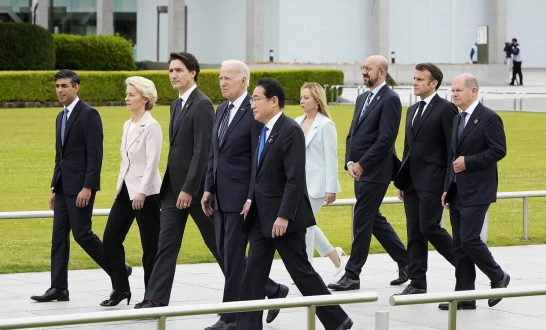The 49th G-7 summit kicked off on Friday in Hiroshima, Japan, and Russia’s war in Ukraine was at the top of the agenda. The bloc unveiled new measures to further restrict Russian access to their countries’ economies, including stricter export controls on Russian oil and gas, transportation efforts, and aircraft manufacturing. “We will starve Russia of G7 technology, industrial equipment and services that support its war machine,” the bloc said in a statement. Individual member countries announced new sanctions of their own as well. The United Kingdom targeted Russian copper, aluminum, nickel, and diamonds. The U.S. Commerce Department added 71 companies to its trade blacklist for supporting Russia; only two of the corporations targeted were not Russian entities.
On Friday, U.S. President Joe Biden told G-7 leaders that the United States would also back a joint initiative with European allies and partners to train Ukrainian pilots on modern military fighter aircraft, including U.S.-made F-16s. The Biden administration has long been reluctant to provide Ukraine with advanced fighter jets despite Kyiv’s pleas, but in recent weeks, Biden’s stance has shifted, and he has signaled to European allies that the United States won’t block them from sending such aircraft to Ukraine. Friday’s announcement that Washington will participate in the international training effort further indicates that Biden’s opposition has softened, though whether Washington will ever go as far as providing F-16s to Ukraine directly remains an open question.
In response to the news, Ukrainian President Volodymyr Zelensky, who is heading to Japan to meet with G-7 leaders in person, tweeted: “I welcome the historic decision of the United States and @POTUS to support an international fighter jet coalition. This will greatly enhance our army in the sky. I count on discussing the practical implementation of this decision at the #G7 summit in Hiroshima.”
Other issues on the first day’s agenda included acknowledging the G-7’s responsibility to lead global fossil fuel reduction; calling on Russia to re-implement the New Strategic Arms Reduction Treaty, known as New START, as well as encourage China and Iran to seek full nuclear nonproliferation; and instituting plans to decrease the bloc’s dependence on China. “The world cannot decouple and does not need de-risking with China as the target,” warned Chinese Foreign Ministry spokesperson Wang Wenbin in response to the G-7’s efforts.
 Eurasia Press & News
Eurasia Press & News



